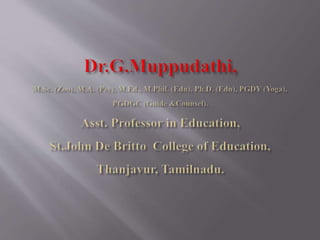
Teacher education
- 2. Teaching is a profession and is a process of professional preparation of teachers, (MHRD, 2012). Teaching is an art that can be acquired through a series of well-designed activities, its’ imperative, therefore due emphasis should be laid on the education of the teachers.
- 3. NCFTE (2010), described that teaching is a profession and teacher education is a process of professional preparation of teachers. “If you educate a boy, you educate one individual, If you educate a girl, you educate a teacher, If you educate a teacher, you educate a community. “Knowledge is power” implies that teaching is an art that can be acquired through a series of well- designed activities, its imperative, therefore due emphasis should be laid on the education of the teachers.
- 4. Teacher education program that it should prepare good teachers by providing them with a sound foundation of the theoretical knowledge, understanding, skills, attitudes and interests. It should enable the trainees to acquire knowledge, skills and techniques for effective teaching and to inculcate in the trainees the desired ideals and behavioural patterns of the society in which we live.
- 5. The improvement of educational provision in every country is greatly dependent on the efficiency of teachers' education. This efficiency in turn, depends on the knowledge and skills obtained during their education on a first level, on the accumulation of their professional experience, its practical application and its interaction with the educational context on a second level, and on the potential offered to the teacher during his/her professional career to adapt to the new developments so that they are able to be constantly updated, improved and modernized.
- 7. The teacher education system through its initial teacher education especially, has a major part to play in the making of a teacher. It makes the initiation of the novice entrant to the calling and such as tremendous potential to imbue the teacher with the aspirations, knowledge – base, repertoire of pedagogic capacities and humane attitudes (NCFTE, 2010).
- 8. Elementary teachers lay the foundation of the progress of a country. Elementary school students belong to the age group of 6-14, is being the critical time of a growing child, giving right direction plays a vital role. Every child is different, every age is different and every child can be molded to be a better and a smarter human being. This is the very important age that a child gains his personality. Grooming a child in this period will develop his personality and give him perspective on life.
- 9. Right of children of free and compulsory education Act (2009), increases the demand manifold for qualified elementary school teachers. The country has to address the need of supplying well qualified and professionally trained teachers in larger numbers in the coming years (NCFTE, 2010).
- 10. NCF (2005), and RTE (2009), recommended that the elementary teacher should be prepared to care for children and also to understand diversity in their social, cultural and political contexts. Pre-service teacher training assumes great significance as a result of the above by providing Diploma in Elementary Education (D.El.Ed.) Programmes to prepare elementary teachers.
- 11. After the completion of the two years D.El.Ed. programme the student teachers will be able to: Attract and retain in the school all school, age children from the school vicinity. Be familiar with socio economic status of families in the neighbourhood.
- 12. Adopt innovation and interesting techniques of teaching children from standards I to VIII. Mobilize means and materials for academic facilitation of the children. Develop appropriate basic personal and special skills in the pupils in each standard.
- 13. The following are the objectives of teacher education at the elementary level. At the end of the programme the trainees will be able, To understand the nature, purpose, problems and issues of elementary education. To evolve need – based, community – specific and child – centred pedagogy including indigenous learning systems.
- 14. To understand the nature and maturity level of children for imparting education for their many sided development. To mobilize and manage community resources for development of school infrastructure. To use the constructivist pedagogy and evaluation techniques.
- 15. To develop desire, taste and capacity for life-long teaching and make them aware of the latest developments in their areas of specialization and the needed transactional skills. To understand the advantages of ICT and use the same for facilitating student learning. To participate in the effective management of the school.
